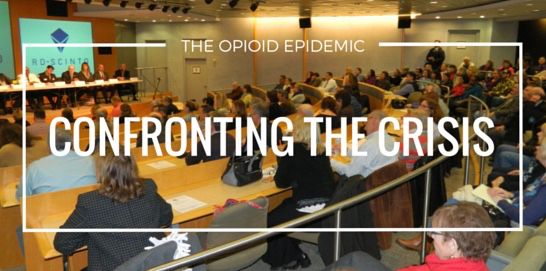 More than 200 people crowded a Shelton auditorium Thursday for a frank, passionate — and often bleak — talk about opiate addiction.
More than 200 people crowded a Shelton auditorium Thursday for a frank, passionate — and often bleak — talk about opiate addiction.
Prompted by a spate of recent overdoses, including two suspected fatal cases in Derby, the two-hour forum ended without much in the way of consensus, other than a hope for the conversation to continue after the headlines fade.
With a host of elected officials, first responders, social service professionals, and nonprofit leaders present, people shared deeply personal stories about their own struggles with addiction or those of their loved ones.
Like the Trumbull woman who said her 28-year-old son went from being a two-sport star in high school to spending $4,000 per week on heroin. She’s worried he’ll die any day now after being kicked out a rehab for admitting a relapse.
Or the Oxford woman who said her family couldn’t get treatment for her son — until she had him put behind bars.
Or the Derby man who tried to kill himself 20 years ago via a heroin overdose — but was saved by paramedics, and now works as a substance abuse counselor.
The forum was hosted by Shelton state Reps. Jason Perillo and Ben McGorty, as well as state Reps. Laura Hoydick and JP Sredzinski, and state Sen. Kevin Kelly.
’We’re All Touched By This’
The state’s Commissioner of Mental Health and Addiction Services, Miriam Delphin-Rittmon, began by talking about how the epidemic impacts every part of society, and is only getting worse.
“We’re all touched by this one way or another, whether it’s a family member, friend, neighbor, sibling, parent,” she said.
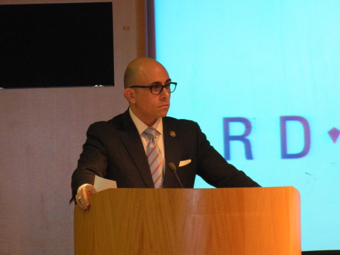 Perillo asked what the situation is like for local health professionals.
Perillo asked what the situation is like for local health professionals.
Joseph Burnett, the director of EMS at Griffin Hospital, said he’s seen an increase of about 25 percent a year at the hospital’s ER in patients seeking treatment for opiate addictions.
Burnett talked about Narcan, a drug given to overdose victims to bring them back to life.
Many treatment advocates want the drug to be made more widely available.
Burnett said Narcan is important,but not the be all and end all — it must lead to a patient getting more help.
Perillo asked whether access to Narcan could be giving addicts a false sense of security, or “enabling” them.
Kevin Giasullo, an EMS administrator in Stratford, said that’s a danger.
He said that as more people use the drug,it’s also becoming more expensive — from $4 to $8 per dose three years ago to $40 to $60 now.
He pointed to the high rates of relapse for people who overdose, survive, and then seek treatment.
“I do think that the risk is there that we could be enabling by making Narcan available to the public,” he said.
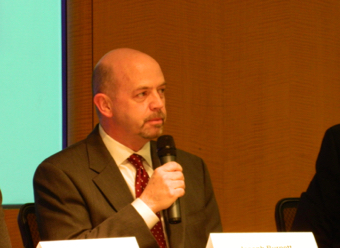 Burnett said that you can look at it two ways — a Narcan revival gives an addict another opportunity to use, but also gives them another chance to get better.
Burnett said that you can look at it two ways — a Narcan revival gives an addict another opportunity to use, but also gives them another chance to get better.
Most overdoses are unintentional, he noted.
Often, people try to quit on their own, Burnett said. They make it about three days before withdrawal sickness gets “overwhelming.” They decide to use again, but their tolerance levels have changed, and they overdose.
In response to an audience question, Burnett said a bill currently being discussed at the legislature would expand the availability to Narcan to first responders.
Asked if the drug could be made available over the counter, Perillo said legislators in Hartford are willing to discuss the idea.
“It’s on the table,” he said.
’There is hope’
Many of those in attendance shared personal stories of their own addictions, or those of their loved ones.
For example, a Trumbull woman said she worries her son will die any day after he searched all over the state for a rehab program, only to be kicked out after a week from a New London facility after using again.
The facilities themselves are in disrepair, she said, and attract prostitutes and drug dealers, making recovery all the more difficult.
Ray, a Derby resident, said he tried to kill himself with a heroin overdose in 1996.
He thanked paramedics and Griffin Hospital for saving his life with Narcan. He’s worked as a substance abuse counselor for the past 16 years.
More help for addicts is desperately needed, he said.
“We need recovery houses, we need beds, sober houses, treatment, longer treatment,” he said. “There’s hope. Don’t give up. keep calling, keep reaching out.”
Kevin Morse, who is in recovery,said families of addicts are emotionally fraught,and while treatment services are out there, the state needs to do a better job of helping families navigate the system.
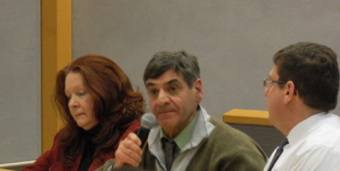 John Saccu is the head of Derby’s Youth Services Bureau.
John Saccu is the head of Derby’s Youth Services Bureau.
He said schools should be doing more to discourage drug use among young people.
But he complained that it’s often not seen as a priority.
“The budgets of our agencies are cut year after year after year,” he said. “Prevention is part of this process and we must have our legislators understand that this is absolutely vital if we are going to get to the point where we’re going to get our people into treatment. We have to get to them earlier.”
Soon after, an audience member said kids are experimenting with marijuana at younger and younger ages, and said it would be “unconscionable” to legalize it and derive tax money from sales if “kids (are) running around stoned.”
Another speaker said that if marijuana were legalized, the tax revenue could fund rehabs.
 Pamela Mautte, the executive director of the Valley Substance Abuse Action Council, said communities where marijuana has been legalized for recreational use — Colorado, namely —have seen more DUIs and higher rates of teens using.
Pamela Mautte, the executive director of the Valley Substance Abuse Action Council, said communities where marijuana has been legalized for recreational use — Colorado, namely —have seen more DUIs and higher rates of teens using.
And while it’s almost physically impossible to overdose on marijuana, ER visits have increased for visitors to the state who have had “bad experiences” with the drug, she said.
“It’s not as successful as it’s made out to be on the media,” Mautte said.
Shelton Mayor Mark Lauretti said that while the community has to work together on the problem, prevention begins at home.
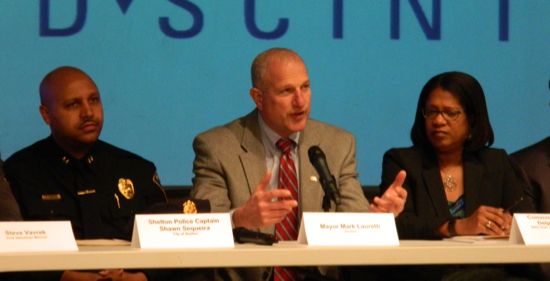
“How much do you expect the schools to do in terms of being able to educate them on societal issues?”Lauretti said. “Once they walk out the doors of the schools there’s got to be some reinforcement that comes from their parents.”
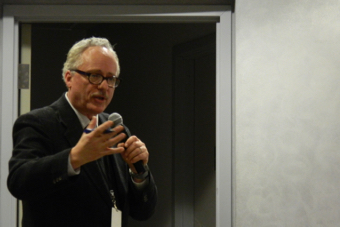 Shelton schools superintendent Christopher Clouet said mental health services need to be expanded, especially for children.
Shelton schools superintendent Christopher Clouet said mental health services need to be expanded, especially for children.
In dealing with addiction, he said, the question for many is an almost existential one.
“Is the glass half empty or half full? We need to help our children answer that question every day in an age-appropriate way,” Clouet said.
Clouet: Hopelessness vs. hope
‘There Is No Help’
A Trumbull woman told the panel her 22-year-old son died of a heroin overdose two years ago.
In comments many others echoed, she said one of the biggest problems when seeking help for him was dealing with private insurance companies.
She said authorities should worry about heroin more than marijuana.
“There is no help out there,” she said, as others applauded.
“Heroin has been an issue, drugs have been an issue, and nobody has done anything about it,” she added later.
An Oxford woman who spent years working in the state Department of Mental Health and Addiction Services said she couldn’t get help for her own son until she had him arrested.
She said people from the courts should be involved in future discussions of the issue.
She also asked Delphin-Rittmon whether the state is changing its approach at all.
The commissioner responded that her agency is trying to work better with others, like a methadone program in the Department of Correction to help people who enter jail already in a treatment program.
That “warm handoff” between social service agencies is important to maintain continuity, she said.
She also said her department will be unveiling a new phone number to help residents access services on Monday, and asked residents to visit the agency’s website for more information on getting help.
Click the play button below to listen to the Feb. 22 episode of “Valley Navel Gazing,” this publication’s weekly talk show, which discussed the opioid epidemic.
During this week’s episode, we asked U.S. Sen. Chris Murphy to talk about the issue. Click the play button below to listen — the discussion of the opioid epidemic begins about 31:20.